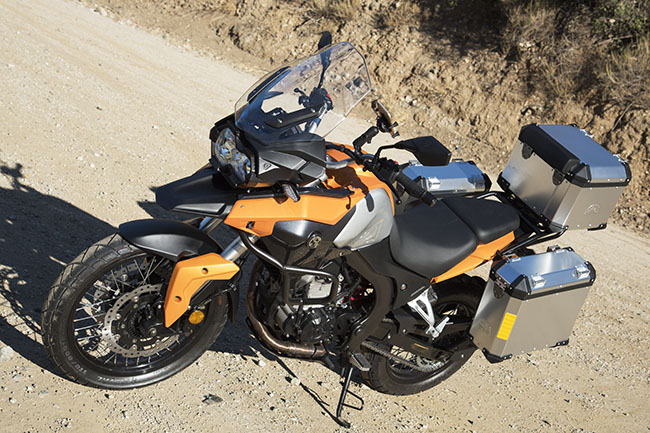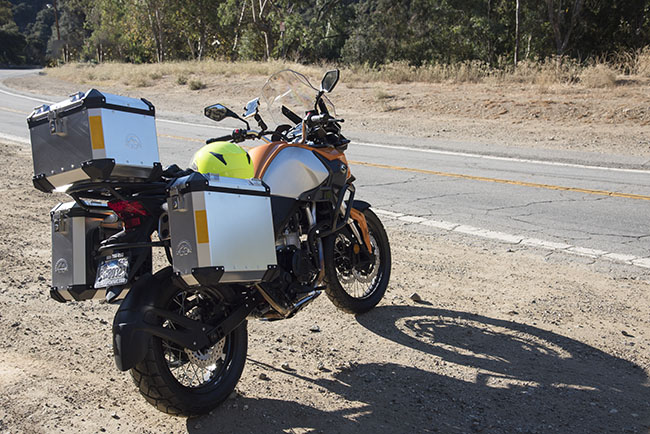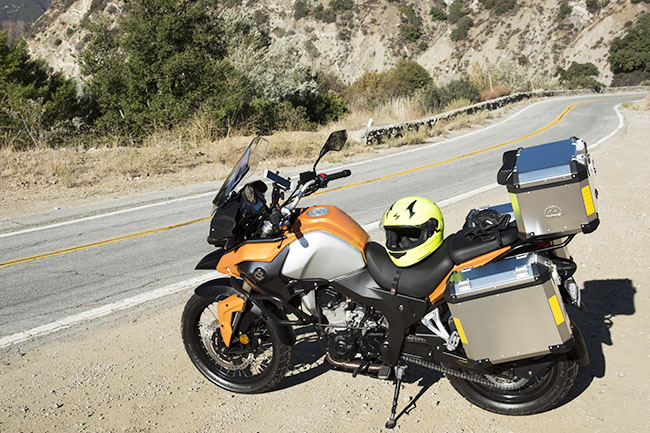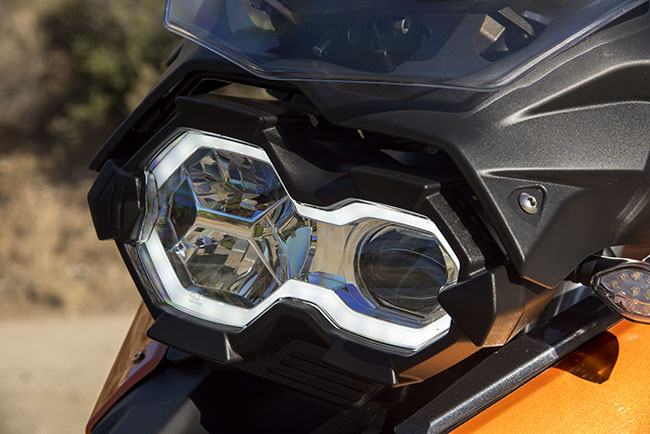
I rode my TT 250 to the CSC plant early today and picked up a new RX4. Steve asked me to ride the RX4, make observations, and write about the new bike on the ExhaustNotes and CSC blogs. I’ll be preparing several blogs on the RX4; this is the first of many.
I rode my favorite Azusa Canyon, East Fork Road, Glendora Mountain Road, and Glendora Ridge Road route. It’s one of my favorite rides, it’s just under 50 miles of the best riding on the planet, and I knew it would give me a good chance to wring out the bike’s handling. The RX4’s handling was my biggest concern going into this review, as the RX4 I first rode in China two years ago left a bad taste. That early bike was porky and it handled poorly.
First significant observation: The RX4’s handling is phenomenal. It’s really, really good. I’ll get to that in more detail, but I wanted to mention that first.

Next, let me tackle the weight issue. That was another one of my earlier concerns, but not anymore. The RX3 has a published weight of 386 lbs. The RX4 has a published weight of 450 lbs. I never put much stock in any published weight figures, because I know how the manufacturers calculate weight. They do it the same way we did it in the defense industry: Mass properties analysis. Some engineering weenie tucked away in a cubicle looks at the dimensions of every part, calculates each part’s volume, identifies the part’s material and its density, and puts it all together in a spreadsheet to calculate total weight. It’s a scientific guess. They’re always low compared to reality.
Me? I go by what the bike feels like and how it handles. Sometimes if there’s a scale handy I’ll do something old-fashioned and actually weigh the thing. My KLR 650, for example, had a published weight of something in the low-400-lb range. We had a scale when I worked at Layne, and I rode the KLR onto it one night and saw that my Kawasaki actually tipped the scales at well over 560 lbs. So much for published weights.
So, the RX4 is heavier than the RX3. No, I didn’t have a scale available, so I didn’t weigh it today and I don’t know if that 450 lb number is accurate or not. The weight concerned me big time in China two years ago, and then again when I first sat on the new RX4 last week. Last week, it was mostly because the bike felt heavy when I tipped it off the sidestand. Last week, the RX4 had the CSC tall seat on it. And, the RX4 has a 19-inch front wheel (the RX3 has an 18-inch front wheel). The bigger wheel and the tall seat make the bike taller, and that 19-inch front wheel means the bike leans at a perceptibly steeper angle on the sidestand, so tipping it to vertical (off the sidestand) made for a noticeable increase in effort compared to my RX3. First order of business was to have the boys put the stock seat on the new RX4 (it takes the same seat as the RX3). That alone made it easier to get off the sidestand. But yeah, it’s heavier than the RX3. Is it a problem? Read on, my friends.
It was on to my ride, where I would soon learn if the RX4’s added weight adversely impacts handling.
Let me get to the good stuff. I was soon on Highway 39 and in the twisties. The bottom line? The bike handles phenomenally well. It feels more planted than the RX3 and handled the twisties just fine. Actually, it was great. The bike handles better than the RX3, and the RX3 is a sweet handling ride.
I wanted to stop for photos on 39 (I have a few favorite photo op spots), but truth be told, I was having too much fun riding the thing. The RX4 sounds a lot like the RX3, but the exhaust note (love that phrase) is a bit deeper and a bit louder. Not objectionably so, but it’s noticeable.
I stopped for a few photos on the East Fork Road, and then I was on Glendora Mountain Road. I had the road to myself and it was a glorious morning. Cool, crisp, California mountain air. Life is good.
Glendora Moutain Road is all tight uphill twisties. This stretch climbs sharply and it literally has no straights; it’s curve city all the way to the top. To cut to the chase here, it was on this stretch that I could feel the RX4’s huge improvement over the RX3. In the lower rev ranges, the RX4 has more grunt than the RX3, but it’s not a dramatic difference. It just has more oomph in the 3500-5000 rpm range.
Then I noticed a couple of things: I was getting through this stretch way faster than I would on my RX3, and I wasn’t rowing up and down through the gears like I would on my RX3. I just left the RX4 in 3rd and throttled up and down as needed. The bike wasn’t in its power band yet (and it’s not broken in yet), but it liked being in 3rd powering up into the San Gabriels. Then I noticed something else: This bike handles. It’s rock solid and it doesn’t seem to have any lean angle limits. Oh, I know it does and at some point something would have to scrape, but let me tell you, I was surprised at how good I must have looked carving my way up there this morning. I kind of wished somebody had been there to YouTube the thing. I was cooking. I’m not normally a guy who cooks, but I sure was cooking this morning.
The run east on Glendora Ridge Road was similarly exciting (I mean that in a good way). From the time I left Highway 39, all the way up on Glendora Mountain Road, and then all the way to Mt. Baldy Village on Glendora Ridge Road, I had the road to myself. I didn’t see a single other car or motorcycle. That doesn’t happen too often. Like I said, it was a glorious morning.

A quick check on my GPS shows the RX4 speedo to have the characteristic Zongshen 10-12% optimism built in. The speedo reads faster than you are actually going, just like it does on my RX3. I don’t know why these guys won’t correct this. I tried. Hey, it is what it is.
More impressions: The peg to seat distance felt very slightly cramped for me with the stock seat. It wasn’t a big deal. I guess I need to find something negative to say to be like one of the magazine guys, and so far, this and the speedo error are it. I have the tall seat on my RX3 (which is a better deal from a comfort perspective). I may have Steve put the tall seat back on the RX4. There may be an opportunity down the road for CSC to offer a footpeg lowering kit. But it’s not a deal breaker. I guess I’d say the RX4 felt about like my Triumph Tiger used to feel.
A lot of guys want to know about the brakes. They’re a significant step up from the RX3’s stock brakes. The RX4 has dual disks up front. I have the large diameter aftermarket front brake on my RX3, and the RX4 subjectively felt maybe a little bit better than that. On that subject, though, I will tell you that I think the whole issue of the RX3 standard front brake has been overblown. I made a comment about the magazine guys having to find something to bitch about to prove they are objective and not unduly influenced by advertising dollars. On the RX3 it was the front brake. I never quite got that, though. I had a Harley Softail and a KLR 650 before I got my RX3, and the stock RX3 front brake was better than either of those bikes.
I like the headlight on the RX4. I have no idea how good it is at night (that will come later); my comment is based on the looks of the thing. The way it works it has a trace light around the headlight (that’s the daytime light). You can either switch the headlight on, or leave the lights on auto and when it gets dark, the lights will come on automatically. When I first saw this headlight in China, I thought it looked too much like BMW’s GS headlight design, but it’s grown on me. You can bet some Internet weenie will make a snarky comment about Zongshen copying BMW. Throw ’em a bone, boys. They gotta bitch about something.

The bike I’m riding has a pearlescent metalflake orange and silver paint theme. It’s beautiful. I don’t know what colors CSC will specify for their production order, but I hope this one makes it to our shores. It’s way nicer, I think, than the standard RX3 orange. I know that orange bikes are faster, too. It’s a win-win.
My RX4 has the optional Tourfella aluminum bags and top case. I rode with these through the Andes in Colombia (I like being able to say that). The Tourfella luggage capacity is amazing. They are huge, though, and I know on an RX3 I can feel the difference in handling between the stock bags and the Tourfella bags (on an RX3, the stock bags are faster). I didn’t have an RX4 with stock bags to make a similar comparison. It’s a tough question; I don’t what I would do on a new RX4. I do like those big aluminum boxes, though.
So, my first impression is that the RX4 is an awesome motorcycle. The handling is great. It just seems to find its way through the corners and the added power makes the bike feel more planted and more stable, if that makes sense to you. I would say it’s the bike’s strongest point.
Steve told me the RX4 is going to sell for $5,895. That’s $2,000 more than an RX3. Is it worth it? In my opinion, yes (assuming you’ve got the shekels). But I will also say this: The RX3 is one hell of a motorcycle, and I like the idea of a 250 for serious adventure touring in less developed countries. We’re a freeway country. In other parts of the world, freeways are rare or non-existent. Don’t get me wrong; I’ve done a lot of freeway miles on my RX3 and it’s quite capable in that environment. But the RX4 would probably be better on the freeway. I say that having ridden no freeways on the RX4. Yet. All in good time.
There’s a lot more coming on this bike, folks. I’m just getting started. Top end, high speed long distance touring, fuel economy, freeway handling, and more…I’ll get into all of that. I’ve got a lot going on back at the ranch right now, but I may see a quick two-day ride through Baja on this bike. Hey, I gotta probe for weaknesses, or this wouldn’t be a complete report.
One last thing…somebody asked the spoke diameter. Before I forget, Joey measured that for me before my ride this morning. It’s 3.5mm up front, and 4.0mm in the rear.
Need I say it? Stay tuned…


